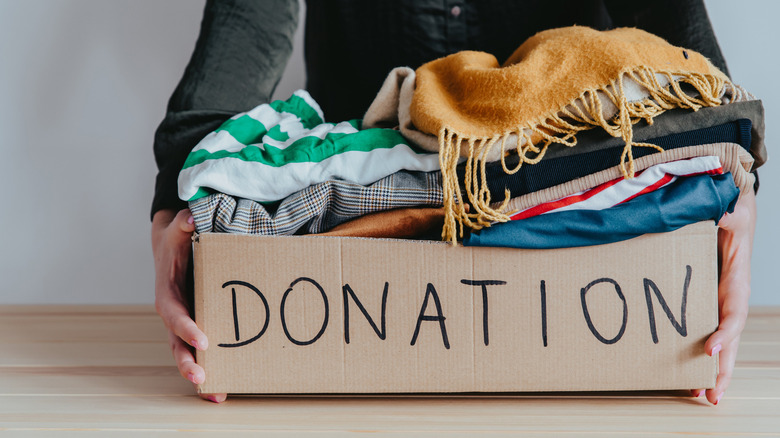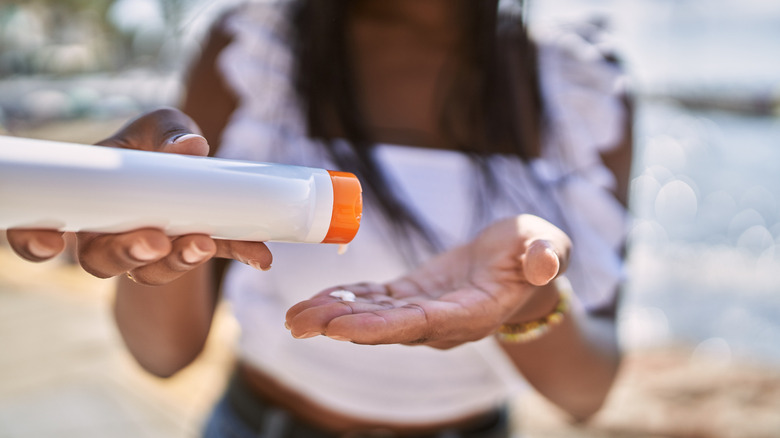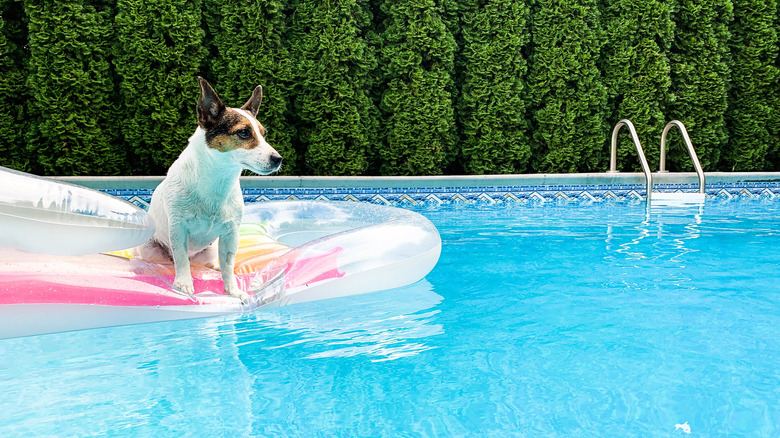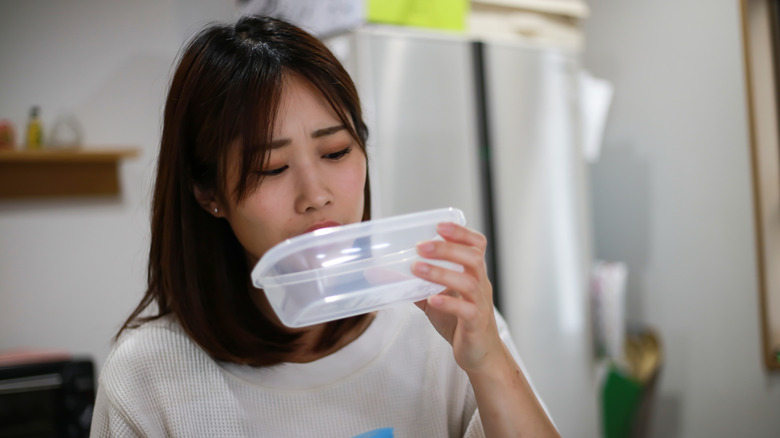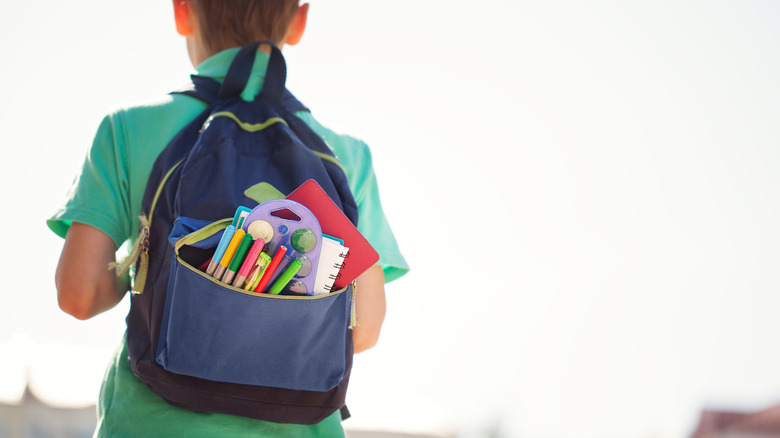5 Savvy Decluttering Tips To Help You Prepare For Fall
Truth be told, decluttering your space is something that should be done on an ongoing basis. Many professional organizers, such as Abby Organizes, will recommend keeping a donation bag in your closet or somewhere throughout your home to remind you to always be letting go of what no longer serves you. If you've been slacking throughout the year so far, now is the time to make up for it and to get ready for fall.
The season is often thought of as the one in which we can reboot. Forbes points out that this is the perfect time to begin to focus and get back into a routine as kids go back to school and the relaxing summer months shift towards more productive work. And, according to In Order to Succeed, it's smart to use the autumn months to declutter because, before we know it, it may be too cold, or even too busy, to get it done as we head into the winter and holidays.
Ahead you'll find five savvy decluttering tips to help you prepare for fall. From tossing those broken flip-flops and expired sunscreen and more, these ideas will inspire you to hit that reset button as we head into a new season.
1. Summer clothes and shoes
It's always a good idea to go through your clothing at the end of each season to assess what was worn and what wasn't. This helps you to decide what to donate or sell because it means that it's simply cluttering up your closet with things you don't love (and that someone less fortunate might!). This goes for shoes and accessories as well. Our summer stuff tends to see more wear and tear from being outside than other seasonal items. So it's particularly important to sift through it all to decide what can go.
The decluttering pile can include stretched-out bathing suits, uncomfortable sandals, shorts that no longer fit, tee shirts or tank tops with irreversible stains, straw hats that lost their shape and swim coverups that have developed snags. And, of course, things you just don't like or won't wear. Use your judgment to decide if something is donatable, salable, or trash. Per Simply Spaced, items that are in excellent condition but you just don't wear can go to consignment stores, whereas worn items can go to a donation center.
Becoming Minimalist insists that if you didn't wear something at all in the past year, it's time to declutter it. It's really up to you and your discretion or lifestyle to decide how long to hold onto an item. However, as a reminder, the longer it lingers, the more it simply becomes clutter.
2. Sunscreen and bug spray
It's very likely that the linen closet, medicine cabinet, mudroom, or garage is home to your outdoor summer essentials, namely, sunscreen and bug spray. These should be gone through now to make sure they're still good and will be by the following summer season. As an aside, it will also let you note what you need to replenish in the coming year.
According to the FDA, sunscreen is required to have an expiration date on the bottle, but it can still be effective three years past the date. If you're concerned about the dangers of skin cancer and would rather play it safe, it's up to you to decide when to let go of it. Bug spray has about the same shelf life, according to Insider, and won't be as successful in staving off mosquitos past its prime. So if you're also concerned about disease-borne bug bites, it's best to stick with the products in your home that are still good.
Staying organized with both your sunscreen and bug spray bottles is key to making sure you use them before they go bad. The Container Store suggests having one designated spot to store them all, such as a basket in your entryway, so that you always know where to find them and, more importantly, where to put them back.
3. Outdoor and pool toys
Your garage or shed might also be hiding some less than desirable outdoor equipment that you should consider letting go of as we head into fall. From rafts or floats that have unrepairable rips to broken bubble machines and from ratty towels to things you or the kids didn't touch at all this season, you can declutter quite a bit this time of year. Doing so will help keep your storage spaces tidier and allow you to better enjoy next season.
Pickup Please, a free program that helps people donate to the Vietnam Veterans of America, explains that getting rid of the outdoor clutter will create a more relaxing outdoor environment overall. They advise creating two boxes, one for donations and the other for trash or recycling. Note that most items to donate should be in usable and in good working condition.
A great place to donate any old beach or pool towels would be to your local animal shelter. Per Earth911, doing so will give rescue dogs much-needed comfort when being groomed or even taking a snooze. This can go for sheets and blankets that you had reserved for the sand but never actually used this past season.
4. Kitchen and pantry
While it might not be as obvious as some of the stuff we've mentioned already, the kitchen and pantry areas should also be given a good look-over before the start of fall. Any food that's expired, specifically things you have a lot of in the summer months like ice cream, ice pops, and smores ingredients, should be tossed. This will allow space for healthier meals or snacks to take to school or work as you begin to reset again.
In the kitchen, go through any grilling tools, ice pop molds, drink dispensers, frozen cocktail blenders, and picnic baskets to determine what you actually used this past season (or will in the next) and what is no longer usable. Just like with your outdoor stuff, create a donation or a trash pile. You can even post it on a local marketplace page to see if a neighbor is interested in it.
When it comes to food storage containers, again, think about starting fresh in the fall. Go through all of your Tupperware or glass food storage containers and decide when it's time to get rid of them. The same can go for adult or children's lunchboxes. If they're not taken care of or cleaned properly, something that A Personal Organizer suggests should be done as soon as you get home, they can get stained or ruined.
5. Office and school supplies
A new school year predictably means new school supplies. But what happens when you have a slew of them from the previous semester? Whether it be half-used notebooks or broken crayons, it's a good idea to go through and declutter before bringing in anything new. For example, try reusing as many untouched supplies as you can so that you don't need to spend unnecessary money or create unnecessary clutter.
For things such as a half-used notebook, try repurposing the remaining pages for yourself to jot down notes or journal. Even though it's not required, kids generally want a new backpack at the start of every year. Motherly suggests donating the old one, as long as it's in a good state, to an organization that works with foster children. They also advise to let go of summer reading books that will never get picked up again and all the art or papers they brought home that isn't sentimental. If you're starting fresh with a new box or two of crayons, you can recycle the old ones using the National Crayon Recycling Program.
As for your office supplies or work bag? Consider doing the same if it's in your budget, and having some new things will motivate you to work harder or be better focused this next quarter.
